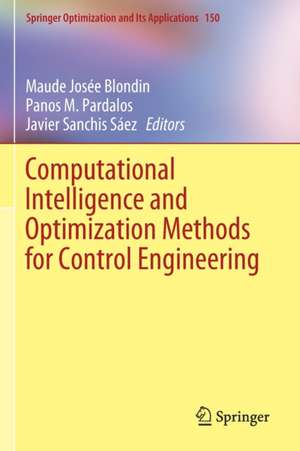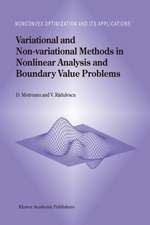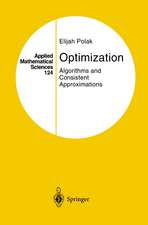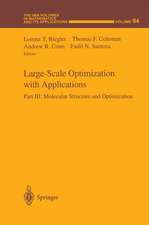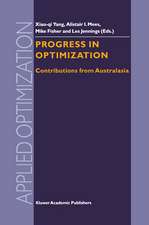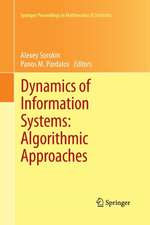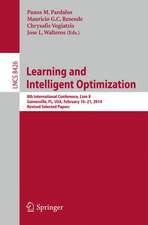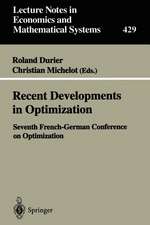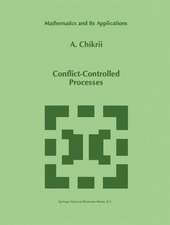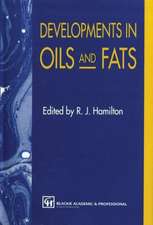Computational Intelligence and Optimization Methods for Control Engineering: Springer Optimization and Its Applications, cartea 150
Editat de Maude Josée Blondin, Panos M. Pardalos, Javier Sanchis Sáezen Limba Engleză Paperback – 2 oct 2020
| Toate formatele și edițiile | Preț | Express |
|---|---|---|
| Paperback (1) | 780.63 lei 6-8 săpt. | |
| Springer International Publishing – 2 oct 2020 | 780.63 lei 6-8 săpt. | |
| Hardback (1) | 785.95 lei 6-8 săpt. | |
| Springer International Publishing – 2 oct 2019 | 785.95 lei 6-8 săpt. |
Din seria Springer Optimization and Its Applications
- 15%
 Preț: 637.28 lei
Preț: 637.28 lei - 15%
 Preț: 659.73 lei
Preț: 659.73 lei - 18%
 Preț: 954.45 lei
Preț: 954.45 lei - 17%
 Preț: 360.79 lei
Preț: 360.79 lei - 13%
 Preț: 458.08 lei
Preț: 458.08 lei -
 Preț: 336.79 lei
Preț: 336.79 lei - 18%
 Preț: 782.11 lei
Preț: 782.11 lei - 17%
 Preț: 397.79 lei
Preț: 397.79 lei - 18%
 Preț: 1124.94 lei
Preț: 1124.94 lei - 15%
 Preț: 641.68 lei
Preț: 641.68 lei - 15%
 Preț: 642.64 lei
Preț: 642.64 lei -
 Preț: 397.54 lei
Preț: 397.54 lei -
 Preț: 377.08 lei
Preț: 377.08 lei -
 Preț: 383.90 lei
Preț: 383.90 lei -
 Preț: 388.48 lei
Preț: 388.48 lei -
 Preț: 542.24 lei
Preț: 542.24 lei - 15%
 Preț: 642.64 lei
Preț: 642.64 lei -
 Preț: 387.40 lei
Preț: 387.40 lei - 15%
 Preț: 645.08 lei
Preț: 645.08 lei - 24%
 Preț: 611.55 lei
Preț: 611.55 lei - 18%
 Preț: 965.44 lei
Preț: 965.44 lei - 20%
 Preț: 585.91 lei
Preț: 585.91 lei - 15%
 Preț: 704.87 lei
Preț: 704.87 lei - 18%
 Preț: 737.14 lei
Preț: 737.14 lei - 15%
 Preț: 653.39 lei
Preț: 653.39 lei - 15%
 Preț: 654.17 lei
Preț: 654.17 lei - 18%
 Preț: 739.67 lei
Preț: 739.67 lei - 15%
 Preț: 700.14 lei
Preț: 700.14 lei - 20%
 Preț: 581.07 lei
Preț: 581.07 lei
Preț: 780.63 lei
Preț vechi: 951.99 lei
-18% Nou
Puncte Express: 1171
Preț estimativ în valută:
149.50€ • 152.55$ • 125.78£
149.50€ • 152.55$ • 125.78£
Carte tipărită la comandă
Livrare economică 26 februarie-12 martie
Preluare comenzi: 021 569.72.76
Specificații
ISBN-13: 9783030254483
ISBN-10: 3030254488
Pagini: 355
Ilustrații: XV, 355 p. 186 illus., 133 illus. in color.
Dimensiuni: 155 x 235 mm
Greutate: 0.57 kg
Ediția:1st ed. 2019
Editura: Springer International Publishing
Colecția Springer
Seria Springer Optimization and Its Applications
Locul publicării:Cham, Switzerland
ISBN-10: 3030254488
Pagini: 355
Ilustrații: XV, 355 p. 186 illus., 133 illus. in color.
Dimensiuni: 155 x 235 mm
Greutate: 0.57 kg
Ediția:1st ed. 2019
Editura: Springer International Publishing
Colecția Springer
Seria Springer Optimization and Its Applications
Locul publicării:Cham, Switzerland
Cuprins
Foreword.- Preface. - Control engineering from classical to intelligent control theory — An overview (Blondin, Sáez, Pardalos).- Main metaheuristics used for the optimization of the control of the complex systems (Borne, Gharbi).- Optimal controller parameter tuning from multi/many objective optimization algorithms (Altinoz).- Fuzzy and neuro-fuzzy control for smart structures (Tairidis, Stavroulakis).- Computational intelligence in the desalination industry (Cabrera, Carta).- Control of complex biological systems utilizing the neural network predictor (Bamgbose, Li, Qian).- A real-time big-data control-theoretical framework for cyber-physical-human systems (Gusrialdi, Xi, Qu, Simaan).- Distributed optimization based control on the example of microgrids (Braun, Sauerteig, Worthmann).- Coherency estimation in power systems: A Koopman operator approach (Chamorro, Ordonez, Peng, Gonzalez-Longatt, Sood).- Appliance identification through non-intrusive load monitoring in residences (Gogos, Georgiou).- Management suggestions for process control of semiconductor manufacturing: An operations research and data science perspective (Khakifirooz, Fathi, Chien, Pardalos).- Feedback control algorithms for the dissipation of traffic waves with autonomous vehicles (Monache, Liard, Rat, Stern, Bhadani, Seibold, Sprinkle, Work, Piccoli).- Disturbance rejection run-to-run controller for semiconductor manufacturing (Khakifirooz, Fathi, Pardalos).- Energy management improvement based on fleet learning for hybrid electric buses (López-Ibarra, Herrera, Milo, Gaztañaga, Camblong).
Notă biografică
Maude Blondin graduated with a PhD in Electrical Engineering from the Université du Québec à Trois-Rivières, where she obtained the prestigious Vanier Canada Graduate Scholarship. During her PhD, she did a six-month internship at the Universidad Politecnica de Valencia, under the supervision of Javier Sanchis Saez. She moved to Florida to work in close collaboration with her PhD co-advisor, Panos M. Pardalos. Her doctoral research was on computational intelligence methods, and soft computing techniques applied to control engineering. Dr. Blondin is currently a postdoctoral researcher in the mechanical and aerospace engineering department at the University of Florida. She is expanding her research interests to the use of multiobjective optimization applied to multiagent control strategies.
Panos M. Pardalos serves as distinguished professor of industrial and systems engineering at the University of Florida. Additionally, he is the Paul andHeidi Brown Preeminent Professor of industrial and systems engineering. Pardalos is also an affiliated faculty member of the computer and information science department, the Hellenic Studies Center, and the biomedical engineering program. Additionally, he serves as the director of the Center for Applied Optimization. Pardalos is a world leading expert in global and combinatorial optimization. His recent research interests include network design problems, optimization in telecommunications, e-commerce, data mining, biomedical applications, and massive computing. Pardalos is a prolific author who lectures all over the world. He is the recipient of a multitude of fellowships and awards, the most recent of which is the Humboldt Research Award (2018).
Javier Sanchis Sáez received his B.Sc. (1993) and Ph.D. (2002) in Computer Science from Universidad Politécnica de Valencia (Spain). He is a professor in the Department of Systems Engineering and Control ofthe same university. His main research interests are multivariable predictive control, process optimisation and computational intelligence methods for control engineering. Professor Sanchis is co-author of Controller Tuning with Evolutionary Multiobjective Optimization (Springer, 2017) and is the author of more than fifty research papers on integration of computational intelligence methods with control engineering.
Textul de pe ultima copertă
This volume presents some recent and principal developments related to computational intelligence and optimization methods in control. Theoretical aspects and practical applications of control engineering are covered by 14 self-contained contributions. Additional gems include the discussion of future directions and research perspectives designed to add to the reader’s understanding of both the challenges faced in control engineering and the insights into the developing of new techniques. With the knowledge obtained, readers are encouraged to determine the appropriate control method for specific applications.
Caracteristici
Features case studies (Chapters 3-14) for engineering applications Utilizes state-of-the-art in control optimization techniques Provides the reader with future directions and insights into developing new techniques
